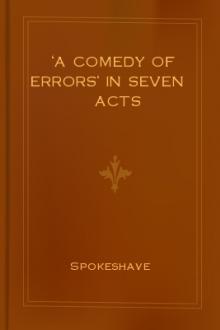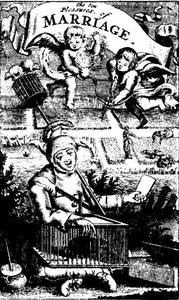A Wodehouse Miscellany: Articles & Stories by P. G. Wodehouse (websites to read books for free .txt) 📗

- Author: P. G. Wodehouse
Book online «A Wodehouse Miscellany: Articles & Stories by P. G. Wodehouse (websites to read books for free .txt) 📗». Author P. G. Wodehouse
He takes a stiff bracer, ties a vinegar-soaked handkerchief round his forehead, and sets to work to remodel his piece. He is a trifle discouraged, but he perseveres. With almost superhuman toil he contrives the only possible story which will fit the necessities of the case. He has wrapped up the script and is about to stroll round the corner to mail it, when he learns from the manager who is acting as intermediary between the parties concerned in the production that there is a slight hitch. Instead of having fifty thousand dollars deposited in the bank to back the play, it seems that the artistes merely said in their conversation that it would be awfully jolly if they did have that sum, or words to that effect.
By this time our author has got the thing into his system: or, rather, he has worked so hard that he feels he cannot abandon the venture now. He hunts for another manager who wants something musical, and at length finds one. The only proviso is that this manager does not need a piece built around two stars, but one suited to the needs of Jasper Cutup, the well-known comedian, whom he has under contract. The personality of Jasper is familiar to the author, so he works for a month or two and remoulds the play to fit him. With the script under his arm he staggers to the manager's office. The manager reads the script—smiles—chuckles—thoroughly enjoys it. Then a cloud passes athwart his brow. "There's only one thing the matter with this piece," he says. "You seem to have written it to star a comedian." "But you said you wanted it for Jasper Cutup," gasps the author, supporting himself against the water-cooler. "Well, yes, that is so," replies the manager. "I remember I did want a piece for him then, but he's gone and signed up with K. and Lee. What I wish you would do is to take this script and twist it to be a vehicle for Pansy Glucose."
"Pansy Glucose?" moans the author. "The ingenue?" "Yes," says the manager. "It won't take long. Just turn your Milwaukee pickle manufacturer into a debutante, and the thing is done. Get to work as soon as you can. I want this rushed."
All this is but a portion of the musical comedy author's troubles. We will assume that he eventually finds a manager who really does put the piece into rehearsal. We will even assume that he encounters none of the trials to which I have alluded. We will even go further and assume that he is commissioned to write a musical comedy without any definite stellar personality in mind, and that when he has finished it the manager will do his share by providing a suitable cast. Is he in soft? No, dear reader, he is not in soft. You have forgotten the "Gurls." Critics are inclined to reproach, deride, blame and generally hammer the author of a musical comedy because his plot is not so consecutive and unbroken as the plot of a farce or a comedy. They do not realize the conditions under which he is working. It is one of the immutable laws governing musical plays that at certain intervals during the evening the audience demand to see the chorus. They may not be aware that they so demand, but it is nevertheless a fact that, unless the chorus come on at these fixed intervals, the audience's interest sags. The raciest farce-scenes cannot hold them, nor the most tender love passages. They want the gurls, the whole gurls, and nothing but the gurls.
Thus it comes about that the author, having at last finished his first act, is roused from his dream of content by a horrid fear. He turns to the script, and discovers that his panic was well grounded. He has carelessly allowed fully twenty pages to pass without once bringing on the chorus.
This is where he begins to clutch his forehead and to grow gray at the temples. He cannot possibly shift musical number four, which is a chorus number, into the spot now occupied by musical number three, which is a duet, because three is a "situation" number, rooted to its place by the exigencies of the story. The only thing to do is to pull the act to pieces and start afresh. And when you consider that this sort of thing happens not once but a dozen times between the start of a musical comedy book and its completion, can you wonder that this branch of writing is included among the dangerous trades and that librettists always end by picking at the coverlet?
Then there is the question of cast. The author builds his hero in such a manner that he requires an actor who can sing, dance, be funny, and carry a love interest. When the time comes to cast the piece, he finds that the only possible man in sight wants fifteen hundred a week and, anyway, is signed up for the next five years with the rival syndicate. He is then faced with the alternative of revising his play to suit either: a) Jones, who can sing and dance, but is not funny; b) Smith, who is funny, but cannot sing and dance; c) Brown, who is funny and can sing and dance, but who cannot carry a love-interest and, through working in revue, has developed a habit of wandering down to the footlights and chatting with the audience. Whichever actor is given the job, it means more rewriting.
Overcome this difficulty, and another arises. Certain scenes are constructed so that A gets a laugh at the expense of B; but B is a five-hundred-a-week comedian and A is a two-hundred-a-week juvenile, and B refuses to "play straight" even for an instant for a social inferior. The original line is such that it cannot be simply switched from one to the other. The scene has to be entirely reconstructed and further laugh lines thought of. Multiply this by a hundred, and you will begin to understand why, when you see a librettist, he is generally lying on his back on the sidewalk with a crowd standing round, saying, "Give him air."
So, do not grudge the librettist his thousand a week or whatever it is. Remember what he has suffered and consider his emotions on the morning after the production when he sees lines which he invented at the cost of permanently straining his brain, attributed by the critics to the impromptu invention of the leading comedian. Of all the saddest words of tongue or pen, the saddest—to a musical comedy author—are these in the morning paper: "The bulk of the humor was sustained by Walter Wiffle, who gagged his way merrily through the piece."
ON THE WRITING OF LYRICS
The musical comedy lyric is an interesting survival of the days, long since departed, when poets worked. As everyone knows, the only real obstacle in the way of turning out poetry by the mile was the fact that you had to make the darned stuff rhyme.
Many lyricists rhyme as they pronounce, and their pronunciation is simply horrible. They can make





Comments (0)